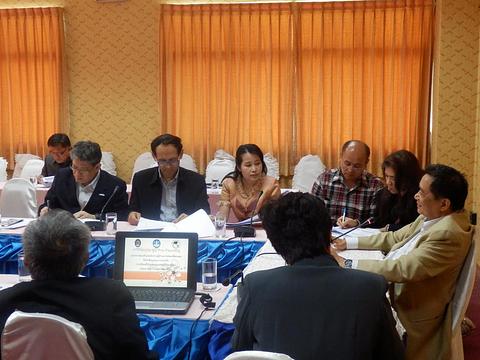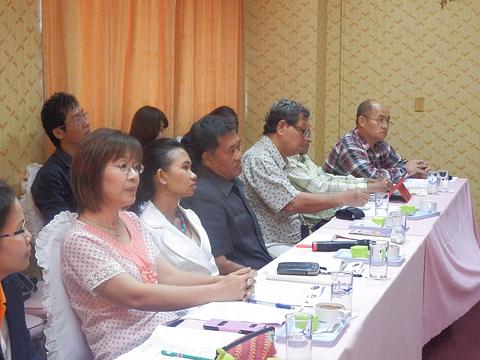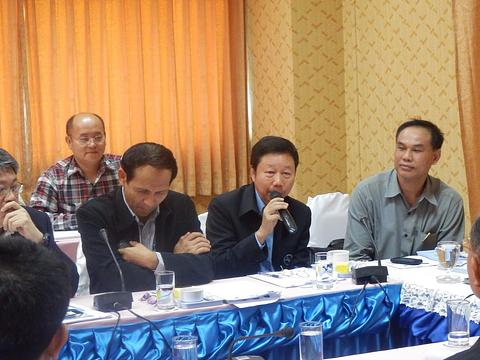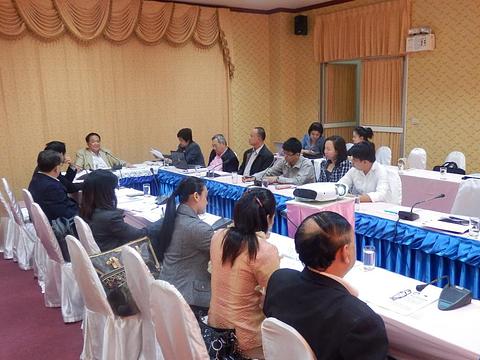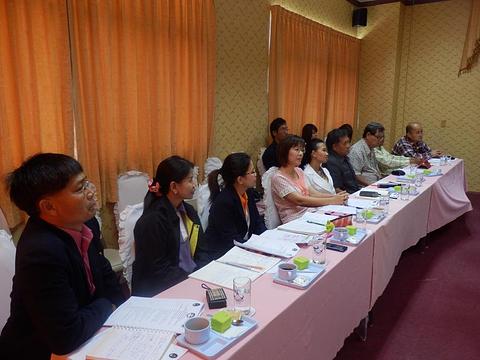สวัสดีครับ
วันที่ 30 เมษายน – 9 พฤษภาคม 2556 นี้ ผมได้รับเกียรติจาก สำนักงานคณะกรรมการป้องกันและปราบปรามการทุจริตแห่งชาติ ร่วมกับมูลนิธิพัฒนาทรัพยากรมนุษย์ระหว่างประเทศ จัดโครงการ “ASEAN Anti-Corruption Youth Camp” โดยได้คัดเลือกผู้แทนเยาวชนจากทั้ง 10 ประเทศ เข้าร่วมกิจกรรมส่งเสริมคุณธรรม จริยธรรม และการแลกเปลี่ยนประสบการณ์การต่อต้านคอรัปชั่นของประเทศนั้น ๆ โดยมีจุดมุ่งหมายเพื่อค้นหาสาเหตุของปัญหาเบื้องลึก สู่การวางแผนการต่อต้านคอรัปชั่นในกลุ่มประชาคมอาเซียนบนรากฐานของการมีคุณธรรม จริยธรรมที่ดีงามที่สามารถนำพาความสุข และความสมดุลสู่ประชาคมอาเซียน
จีระ หงส์ลดารมภ์
“ASEAN Anti-Corruption Youth Camp”
30 April – 9 May 2013
In Thailand.
Tuesday 30th April 2013
Venue :Arnoma Hotel Bangkok
14.00 Hrs. Check in at Arnoma Hotel, Bangkok.
17.30 Facilitators Team’s Meeting
Coached by Prof.Dr.Chira Hongladarom
Mr.Krich Sinudom
18.30 Welcome Dinner at the Hotel
19.30 Thai Students Orientation
Coached by Prof.Dr.Chira Hongladarom
NACC Executives
Day 1: Wednesday 1stMay 2013
Venue: Office of the National Anti-Corruption Commission, Nonthaburi.(Room:Nontaburi 1)
08.30Hrs. Register
09.00 – 10.00 Opening Ceremony
VTR (Knowing NACC)
Opening Remarks
By Mr. Panthep Klanarongran, NACC President
Welcome Remarks
By Professor Vicha Mahakun, NACC Commissioner
10.00 – 10.15 Coffee Break
10.15– 12.00 Orientation & Learning Forum
ASEAN Ethic Role Model and Leadership Development
By Prof. Dr. Chira Hongladarom
Secretary – General
Foundation for International Human Resource Development (FIHRD)
12.00 – 13.00 Lunch
13.00 – 14.00 Group Dynamic (Breaking the ice activity)
By Mr. Krich Sinudom and Team*
14.00 – 15.00 Special Session
Anti – Corruption Watchdog
By Ms. Kobkarn Wattanavrangkul
Chairperson of Toshiba (Thailand) Co., Ltd.
15.00 – 15.15 Coffee Break
15.15 – 16.15 ASEAN Anti – Corruption Cooperation and Role of ASEAN Youth
By Prof.Dr.Pakdee Pothisiri
Commissioner, NACC
16.15-17.45 Ethical Capital and Youth in ASEAN
By Professor Vicha Mahakun
Commissioner, NACC
17.45 – 18.30 Group Dynamic
By Mr.Krich Sinudom and Team*
18.30 – 20.30 Welcome Dinner
Welcome Speech
By Professor Vicha Mahakun
Prof.Dr.Chira Hongladarom
Thai Cultural Show
By Triamudomsuksanomklao Samutprakan School
ASEAN Youth Speech
(Greetings / What do you think about ASEAN Anti-Corruption Youth Camp? / Expectations and Commitment)
By 10 Representatives from each country
Group Photo
20.30 Back to the Arnoma Hotel, Bangkok
Day 2: Thursday 2ndMay 2013
Venue: Arnoma Hotel Bangkok (Room: Anoma 1)
08.00 Hrs. Breakfast
09.00– 12.00 Youth in ASEAN and "Mind Management"
By Phra Maha Wudhijaya Vajiramedhi (Interview)
Mr. Ittipat Pattaramekanon
12.00 – 13.30 Lunch
13.30– 16.30 Learning Forum
White Ocean Strategy and Role of ASEAN Youth
By Mr. Danai Chanchaochai
CEO, DC Consultants and Marketing Communications
16.30 – 19.30 Panel Discussion
360 Degree Analysis of Preventing Corruption
By Assoc. Prof. Dr.Juree Vichit-vadakan
Mr. Thammarak Karnpisit
Moderated by Prof.Dr.Chira Hongladarom
19.30 – 21.00 Dinner & ASEAN Learning Activity
(Group Assignment for Campfire Activity)
By Mr.Krich Sinudom and Team*
Day 3: Friday 3rdMay 2013
Venue: The Sirindhorn International Environmental Park, Cha-Am, Petchaburi
06.00 Breakfast at the hotel
06.45 Depart from Bangkok
09.30 Arrival at The Sirindhorn International Environmental Park,
Cha-Am, Petchaburi.
09.30 – 12.30 Learning Forum & Game Simulation
Creative Thinking for ASEAN Youth Ethics
By Mr. Sarun Chantapalaboon
12.30 – 13.30 Lunch
13.30 – 18.00 Walk Rally & Game Simulation
Effective Teamwork for ASEAN Youth
By Assoc.Prof.Chaleampol Kerdmanee
Station 1: Classroom
Station 2: Study Visit at Mrigadayavan
Coffee Break
Station 3: On the beach
Station 4: On the beach
18.00 – 19.00 Break
19.00 – 22.00 Dinner & Campfire
By Mr.Krich Sinudom and Team*
Day 4: Saturday4thMay 2013
Venue: Study Tour
07.30 Breakfast
08.30 Depart from The Sirindhorn International Environmental Park
09.00 – 12.00 Study Visit
HuaySai Royal Development Study Center, Cha-Am, Petchaburi.
12.00 – 14.00 Lunch
14.00 Return to Bangkok
17.30 Check in at Arnoma Hotel
Day 5: Sunday 5thMay 2013
Venue: ArnomaHotel Bangkok
07.30 Breakfast
08.30 Morning Brief
09.00-12.00 Panel Discussions
Networking Capital Development for Anti – Corruption in ASEAN
By Assoc. Prof. Dr.Juree Vichit-vadakan
Case Study of Anti- Corruption from Malaysia
Moderated by Prof. Dr. Chira Hongladarom
12.00-13.00 Lunch
13.00-16.00 Learning Forum
ASEAN Community and its impact to Anti-Corruption aspect
By Assoc. Prof. Dr. Somchai Pakapaswiwat
16.00 – 18.00 ASEAN Learning Activity
By Mr.Krich Sinudom and Team*
18.00 – 19.00 Dinner
19.00 – 21.00 Group Study : Innovative Project’s Presentation Preparation
Coached by Mr.Kitti Jayangakula and FIHRD Team
Day 6: Monday,6th May 2013
Venue :Arnoma Hotel Bangkok
08.00 hrs. Breakfast
09.00– 12.00 Learning Forum
Panel Discussion
Leadership for ASEAN Youth
By Prof. Kririt Boonyakiat
Dr. Sirilak Meksang
Moderated by Prof.Dr.Chira Hongladarom
12.00 – 13.00 Lunch
13.00 – 16.00 Panel Discussion
Learning from corruption case studies in ASEAN
By Assoc. Prof. Dr. Sirilaksana Khoman
NACC Advisor
Case Study of Anti- Corruption from Singapore
Case Study of Anti- Corruption from Cambodia
Moderated by Prof.Dr.Chira Hongladarom
16.00– 19.00 ASEAN Learning Activity
By FIHRD Team (City Tour)
19.00 – 20.00 Dinner
20.00 – 21.00 Group Study
Coached by Facilitator Team
Day 7: Tuesday 7th May 2013
Venue :Arnoma Hotel Bangkok
07.30 Breakfast
08.30 Morning Brief
09.00– 12.00 Learning Forum & Group Activity
ASEAN Anti – Corruption Digital Linkage (1)
By Speakers from Electronic Government Agency. (Public Organization) (EGA)
12.00 – 13.00 Lunch
13.00 – 15.00 Learning Forum &Group Activity
ASEAN Anti – Corruption Digital Linkage (2)
: Created facebook fanpages to share knowledge to public
By Speakers from EGA
15.00 – 18.00 Study Visit
Bangkok Post
19.00 – 20.00 Dinner
20.00 – 21.00 Group Study
Coached by Facilitator Team
Day 8 : Wednesday 8th May 2013
Venue :Study Visit, Bangkok
07.00 Hrs. Depart from Arnoma Hotel
08.00– 11.00 Study Visit: The Emerald Buddha Temple and the Grand Palace
11.00 – 12.00 Study Visit: The Thai Chamber of Commerce
12.00 – 13.00 Lunch
14.00 – 16.00 Study Visit: Chai Pattana Foundation
Special Talk
Sustainable Development and the Principle of Sufficiency Economy in ASEAN and Role of Youth
By Ms. Suleeporn Choopavang
Director of the Foreign Affairs Department
Office of the Chaipattana Foundation
Venue: Chai Pattana Foundation
16.30 Pay homage to His Majesty the King and Her Majesty the Queen
at Siriraj Hospital
17.30 Shuttle back to Hotel
18.30 – 19.30 Dinner
19.30 – 21.00 Group Study
Coached by Facilitator Team
Day 9: Thursday 9th May 2013
Venue: Arnoma Hotel, Bangkok
08.00 Breakfast
09.00 – 12.00 Workshop & Presentation
“Innovative Projects for ASEAN Anti-Corruption by ASEAN Youth”
Commented by Prof.Dr.Pakdee Pothisiri
Commissioner, NACC
Prof.Dr.Chira Hongladarom
12.00 -13.30 Lunch
13.30 – 17.00 Break
17.00 Leave for Office of NACC, Nonthaburi
18.00-20.00 Farewell party/ASEAN Night
Certificate Award Ceremony / Closing Ceremony
Venue: Nonthaburi Ballroom, Office of NACC
Day 10: Friday,10th May 2013
Departure of participants
“ASEAN Anti-Corruption Youth Camp”
Opening Address
by
Mr.Panthep Klanarongran
President of the National Anti-Corruption Commission
At the Office of the National Anti-Corruption Commission, Nonthaburi, Thailand,
1 May 2013
……………………………………………………………
Excellencies,
Distinguished Guests,
Prof. Dr. Chira Hongladarom,
Participants,
Ladies and Gentlemen,
Good morning,
I am delighted to be here this morning to preside over the opening ceremony of the ASEAN Anti-Corruption Youth Camp.
First and foremost, allow me to offer a very warm welcome to all participants and resource persons, particularly to those who visit Thailand for the first time. I hope your stay in Thailand will be both educational and enjoyable.
As all of you know, at the ninth ASEAN Summit in October 2003 in Bali, Indonesia, ASEAN leaders signed the Bali Accord II declaring the regional cooperation to establish ASEAN Community.
ASEAN Community has emphasized regional cooperation in the “three pillars”, which are security, economic and socio-cultural integration.
Under the agreed principles of ASEAN Political - Security Community, one of the integral cooperations is that the members committed to share disciplines, values and norms.
With respect to the corruption prevention and suppression part, there are many important activities which ASEAN member countries have to work together. For example, they must promote ASEAN cooperation in the corruption prevention and suppression, work under international cooperation framework and promote the exchange of the best practices in values, ethics and honesty through available channels.
In Thailand, Sanya Dharmasakti Anti-Corruption Institute is a responsible agent for human resource development for the Office of the National Anti-Corruption Commission. The Institute envisages that the values, honesty and anti-corruption must be instilled to the people as earlier as young age, both in Thailand and ASEAN countries. This is to respond to ASEAN’s principles of community in sharing ethical, moral and anti-corruption values.
To enhance such values, the Institute collaborating with Foundation for International Human Resource Development organizes this ASEAN Anti-Corruption Youth Camp.
The main purpose of this Camp is to provide ASEAN’s youths with opportunities to learn about morality, ethics and anti-corruption approaches from Thai experiences and foreign speakers, especially to establish venue for them to work together to gain the best practices in corruption prevention and suppression in ASEAN context. This, I am sure that the outcome in the long-run would enable ASEAN people to adhere to morality and ethics which in turn lead them to happy society with balance and sustainability.
The youths participating in this Camp are delegates from your respective countries. I would like to give some advises that the next nine days will be a special opportunity to make friends and create network for the sustainable friendship in the future. A good example to support such remarks is the successful project on Ship for Southeast Asian Youth Program that has been continuously successful organized for decades. Youths who participated in such project have been still contacting and working together in organizing useful activities up to the present.
With regards to learning frontier, I would like to urge all participants to grasp this golden opportunity to learn from experts, resource persons including assigned activities and study visits to enhance the following goals.
The first goal is to create the sustainable network for youth leaders in corruption prevention and suppression to be able to organize and follow-up activities together in the future.
The second goal is to instill the shared values in morality and ethics which are the integral elements to support sustainably develop youth leadership.
The third goal is to develop ASEAN Community to be Learning Community.
Ladies and Gentlemen
To that note, again I would like to express my highly appreciation to Foundation for International Human Resource Development for its technical support to this project.
Last but not least, I wish all participants of the ASEAN Counter-Corruption Youth Camp an enriching time in Thailand. I trust that you will find this leg of the journey culturally rich and rewarding. It is my hope that you will look back upon your days here with great fondness. Have a wonderful stay in Thailand and memorable journey!
I am now declaring the opening of “ASEAN Counter Corruption Youth Camp.
THANK YOU.
“ASEAN Anti-Corruption Youth Camp”
Welcoming Remark
by
Prof. Vicha Mahakhun
Commissioner, National Anti-Corruption Commission (NACC)
At the Office of the National Anti-Corruption Commission,
Nonthaburi, Thailand
1 May 2013
Mr. Panthep Klanarongran, NACC President,
Commissioners,
Prof. Dr. Chira Hongladarom,
Distinguished Guests,
Resource Persons,
Participants,
Ladies and Gentlemen,
Good Morning,
Today, I deem it a great honor to make this welcoming remark at the start of the “ASEAN Anti-Corruption Youth Camp” this morning. I welcome you as NACC Commissioner who takes care of Sanya Dharmasakti Anti-Corruption Institute (SDI). The NACC is the promoter and guardian of justice in Thailand with the main purpose of fighting against corruption. Our duty is to promote transparency and integrity, and to balance the twin elements of impartiality and fairness - a task we take with great responsibility, duty, and pride. On behalf of Thailand’s National Anti-Corruption Commission and SDI, may I wish you all a very warm welcome, not only to Thailand but also to the opening of this Youth Camp. Many of you have traveled from afar, and come to share great ideas and experiences, all in the single purpose of fighting corruption.
Before going any further, I would like to express the NACC’s gratitude to Foundation for International Human Resource Development (FIHRD) who joins with Sanya Dharmasakti Anti-Corruption Institute (SDI) for providing the technical support to this project, and delegates from ASEAN countries, who are here to share their experience.
Across the region, there are already many examples of youth who have worked together to make a difference for their communities and countries. The former participants of the ship for Southeast Asia Youth Program are good examples. Many of them have been contacting and working together in organizing useful activities up to the present. For youth participants in this Youth Camp, you are young ambassadors of your countries. All of you will eventually be the ASEAN leaders of tomorrow. I believe you can be a positive force for change and make a difference in your countries and this region. From the very outset, I views this Youth Camp as the first of the series, as a foundation to be built upon in the future. I am certain that this Camp will not only provide participants with the opportunity to discuss and share ideas of mutual interest, but will also allow participants to interact with one another. Through such interactions, all participants will have new friends, gain fresh perspective as well as display commitment to closer cooperation to promote the anti-corruption efforts of the region in the years to come.
The corruption is the important problem that has effect on the whole society and country. It is dangerous not only for the human being but also young generation of our community and cause destruction of society. The new NACC Organic Act encompasses comprehensive revisions and additions add more “enforcement mechanisms” to the NACC’s anti-corruption mandate. Today, NACC is implementing many anti-corruption programs and projects so as to deploy those enforcement mechanisms. But this Camp is one of NACC’s flagship projects.
Over the next nine days I shall follow the Camp with great interest as all participants are going to share with each other their experiences. I also hope to learn much from the presentations to be given by resource persons who are academia and practitioner in the field of anti-corruption.
Ladies and gentlemen,
There is a great wealth of experience in the room here this morning. I would like to sincerely thank all delegates for travelling from your countries to be here – I feel that this is itself is a clear indication of the significance and importance of this event.
So without taking up any more of our valuable time it is my great pleasure that I wish you a fruitful gathering, as well as memorable, engaging and enjoyable experience over the next nine days, and also express the hope that you will find a little time to rest and enjoy your stay in this Land of Smiles.
Thank you for your kind attention and Sawasdee Krub.
Orientation & Learning Forum: ASEAN Ethic Role Model and Leadership Development
Prof. Dr. Chira Hongladarom
Secretary-General
Foundation for International Human Resource Development
Prof Chira welcomed all participants from ASEAN countries, and thanked NACC for its cooperation in hosting this Youth Camp. The objectives of this session are to discuss the work to be done together over the coming 9 days, and to exchange ideas among participants.
Prof Chira began with the 3 pillars of cooperation of ASEAN- economic, social/cultural, and security/politics. Because corruption undermines all three of these 3 pillars, it is vital that we address corruption in all its forms.
Whilst ASEAN is moving to facilitate the free flow of goods and services within the bloc, the cost of doing business remains high, and there is a major need to improve ASEAN’s economic integration at global level. These costs are further increased by widespread, deep-seated and systemic corruption, leading to weakening of national competitiveness in a global market.
Corruption also presents risks to national security. It is therefore imperative that the new generation in ASEAN member states should prioritize the fight against corruption by embracing a new ‘Anti-corruption culture’ with a spirit of transparency and honesty.
To accomplish this challenge, collaboration among the people of ASEAN in anti-corruption initiatives will be essential if we are to work, share and learn from one another. Anti-corruption is also a cross-disciplinary effort, requiring expertise in diverse domains. Despite the disparity in implementation of anti-corruption measures around Asia, Prof. Chira expressed the hope that participants in this 9-day Youth Camp would learn, share and reflect, and that ASEAN’s young generation will be motivated to serve as Ambassadors to extend the anti-corruption message in their own countries and around the world.
Prof Chira reminded participants that this Youth Camp will examine diverse beliefs, attitudes and approaches to anti-corruption policies and practices though the lens of “Ethical Capital”. Each country differs in attitudes to corruption according to the prevailing socio-cultural and economic contexts. Prof. Chira noted that in Thailand, money and wealth are the symbols of success, irrespective of how they were acquired. Yet ultimately, we will need to face the enormous conflict with prevailing materialist values across all ASEAN countries, promoted by the media and rewarded by society.
Dr Chira introduced the theories of “8K’s” and “5K’s in the context of building ethical capital, and emphasized the critical importance of nurturing ethical capital among youth in ASEAN. Whilst the ‘8K’s Theory’ identifies 8 categories of capital (human, intellectual, ethical, happiness, social, sustainability, digital and talented), the ‘5Ks Theory’ offers an alternative typology of human capital (Creativity, Knowledge, Innovation, Cultural and Emotional Capital).
Prof Chira emphasized the importance of instilling ethical norms and building ethical capital at an early age- at school and at University. ASEAN can become a role model in this regard.
How important is ethical capital? Peter Drucker said “If a person has 3 qualities: integrity, creativity and innovation, without integrity, creativity and innovation will be useless.”
However, despite its critical role, promoting the notion of ethical capital in our highly competitive world will not be easy, but it will nevertheless be essential. How can we develop a new culture of honesty and transparency, where people earn money based on ability and wisdom, not from corruption; and where the honest are honoured, and the corrupt subjected to social sanction?
After this Youth Camp, it will be important for participants to sustain the linkages built over the coming 9 days in order to develop shared anti-corruption initiatives at regional levels and beyond. Prof Chira concluded his presentation by encouraging participants in this Youth Camp to be inspired by the region’s cultural diversity; we need to foster the ASEAN spirit in order to lead the region on a long and difficult journey, and to share, learn, and work together with a passion to make it happen.
Following his presentation, Prof Chira continued with an orientation to the Youth Camp programme and activities. He encouraged participants to approach the Youth Camp and activities with a 2Rs approach: ’Reality and Relevance’, to be guided by the ‘2I’s: Inspiration and Imagination’, and also to ensure that their ideas and initiatives add value.
Country representatives were then invited to speak from the podium, in regard to expectations from the Youth Camp.
1. Cambodia
· Thanks to Thailand for hosting this Youth Camp
· Inspired by the presentation of Prof Chira
· Family, school and society all have a role in directing and shaping moral values.
2. Indonesia
· Thanks to Thailand for hosting this important Youth Camp.
· Cultural differences are wide within as well as among ASEAN countries.
· Young people in Indonesia tend to have much more of a focus on transparency.
· We call for more cooperation rather than competition within ASEAN.
3. Lao PDR
· Thank you Prof Chira for an inspiring introduction.
· Lao PDR is a developing country- what are the main challenges in building ethical capital?
4. Malaysia
· Gave thanks to NACC, FIHRD and Prof Chira,
· One initiative in Malaysia has been to set up Anti-Corruption secretariats within universities, in order to nurture the integrity of students.
· How can perceptions be changed?
5. Myanmar
· I am here because we believe in diversity for ethical capital development.
· In Myanmar the family is strong, and community-based values are developed at an early stage.
· We look forward to collaborating with others in the region in anti-corruption measures.
6. Philippines
· Is it necessary or desirable to define ‘Corruption’? Definitions can limit the scope.
· Where do you draw the line in regard to social values? Is corruption subjective?
7. Singapore
· Judgment is a more important skill than knowledge.
· In Singapore we have a subject called civic and moral education which is taught in the school curriculum, aiming to instill moral values and the obligations of citizenship from an early age.
· With Singapore’s diversity it is a major and important challenge to find common ground to approach anti-corruption, and we have a lot to learn from our counterparts in ASEAN.
· However, we ask whether the ASEAN policy of minimal intervention in each other’s domestic affairs might serve as an impediment to collaboration on anti-corruption measures.
8. Thailand
· Thanks for the inspiration.
· We have two questions- with 65% of poll respondents in Bangkok claiming they would accept corruption provided there is some benefit, how can we change that?
· How to encourage social sanction against the corrupt?
9. Vietnam
· Vietnam is in a transitional stage, and money is the prime symbol of success in Vietnam today.
· Yet, ethical capital is being instilled through the school curriculum, but more is needed, especially at primary school level.





